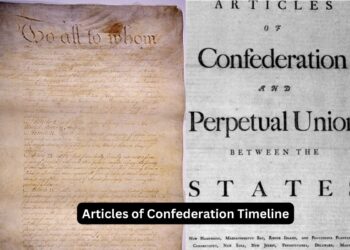Letter from Birmingham Jai Essay Summary By Martin Luther King Jr.
Dr. Martin Luther King Jr. wrote the essay “Letter from Birmingham Jail” in April 1963 while he was incarcerated for taking part in nonviolent demonstrations against segregation in Birmingham, Alabama. The letter comes in reaction to a statement made publicly by eight white clergymen from Alabama who criticised King’s tactics and pleaded with him to end the demonstrations.
Letter from Birmingham Jai Essay By Martin Luther-King addresses the concerns raised by the clergymen and eloquently justifies the use of nonviolent resistance in his letter. He starts by thanking them for their support of his peaceful ideas but then expresses dissatisfaction at their lack of active participation in the civil rights movement.
Also Read-
- Goodbye to Forty-Eighth Street Essay Summary By E.B. White
- Speak, Memory Essay Summary By Vladimir Nabokov’s
- Artists in Uniform By Mary Mc Carthy
- Let Us Now Praise Famous Men Essay Summary By James Agee
Letter from Birmingham Jai Essay By Martin Luther-The African American community decided to take direct action for a variety of reasons, King continues, highlighting the fact that they have exhausted all other avenues for discussion and have no other choice.
Letter from Birmingham Jai Essay By Martin Luther-He contends that their goal is to raise tension and compel the city’s officials to confront the injustices they encounter, not to provoke violence.
Letter from Birmingham Jai Essay By Martin Luther-King makes references to both moral and legal ideas throughout the article, emphasising the moral obligation to fight against unfair laws and practises. He uses philosophical ideas and historical figures to prove the justness of their cause. Asserting that true peace can only be attained via the presence of justice, he also criticises the complacency of white moderates who favour order over justice.
Letter from Birmingham Jai Essay By Martin Luther-King also responds to the clergymen’s worry on the timing of the demonstrations by asserting that there is never a convenient time to seek justice.
He criticises the idea of holding off till a better time, pointing out that the urgency of the fight for civil rights necessitates swift action.
Letter from Birmingham Jai Essay By Martin Luther-King also responds to the charge that he is a “outsider” meddling in local issues. In response, he argues that injustice everywhere affects justice everywhere and that it is his moral obligation as a Christian and an American citizen to fight for equality.
Letter from Birmingham Jai Essay By Martin Luther-King answers to the clergymen’s plea for patience and gradual development in the final section of the essay.
He contends that despite decades of waiting, oppression still persists because of the community of African Americans’ inaction. He emphasises the value of nonviolent resistance, direct action, and civil disobedience as effective strategies for bringing about social change.
About Martin Luther King Jr.
Dr. Martin Luther King Jr. was a prominent leader and activist in the American civil rights movement. He was born on January 15, 1929, in Atlanta, Georgia, and he dedicated his life to advocating for racial equality and social justice.
Letter from Birmingham Jai Essay By Martin Luther-Dr. King was known for his philosophy of nonviolent resistance, influenced by Mahatma Gandhi’s principles of nonviolence.
He believed in peaceful protest as a means to achieve social change and equality. His leadership and eloquence made him one of the most influential figures in the fight against racial segregation and discrimination in the United States.
Letter from Birmingham Jai Essay By Martin Luther-Dr. King played a pivotal role in numerous civil rights campaigns and protests. One of his most famous moments was the 1963 March on Washington for Jobs and Freedom, where he delivered his iconic “I Have a Dream” speech on the steps of the Lincoln Memorial. The speech is widely regarded as one of the most significant speeches in American history.
Letter from Birmingham Jai Essay By Martin Luther-In addition to his activism, Dr. King was also a Baptist minister. He held a Doctorate in Theology from Boston University and frequently incorporated religious and moral arguments into his speeches and writings.
Tragically, Dr. Martin Luther King Jr. was assassinated on April 4, 1968, in Memphis, Tennessee. His death sparked nationwide outrage and led to an outpouring of grief. His legacy, however, continues to inspire generations of individuals fighting for justice, equality, and the fulfillment of civil rights for all.
Letter from Birmingham Jai Essay By Martin Luther-Dr. King’s contributions to the civil rights movement and his unwavering commitment to nonviolent resistance have made him an enduring symbol of hope, equality, and social justice. His words and actions continue to resonate today, reminding us of the ongoing struggle for racial equality and the power of peaceful activism.
Conclusion
“Letter from Birmingham Jail” is a profound and impactful essay that encapsulates Dr. Martin Luther King Jr.’s unwavering commitment to justice and equality. Through his eloquent and persuasive writing, King effectively defends the strategy of nonviolent resistance, counters the criticisms of the white clergymen, and emphasizes the urgency of the civil rights movement.
Letter from Birmingham Jai Essay By Martin Luther-The letter serves as a powerful reminder of the moral duty to oppose injustice and fight for equality, regardless of the challenges and risks involved.
King’s use of historical references, philosophical principles, and personal conviction all contribute to the strength of his argument and his ability to rally support for the cause.
Letter from Birmingham Jai Essay By Martin Luther-“Letter from Birmingham Jail” remains a timeless piece of literature that not only sheds light on the struggles of the civil rights movement but also serves as an inspiration for individuals and activists fighting for justice today. It stands as a testament to the power of peaceful resistance, the necessity of direct action, and the unyielding pursuit of equality for all.
FAQ.
Q: Why was Dr. Martin Luther King Jr. in Birmingham Jail?
A: Dr. King was arrested and imprisoned for participating in nonviolent protests against racial segregation in Birmingham, Alabama.
Q: Who were the clergymen that Dr. King was responding to in his letter?
A: The clergymen were eight white Alabama religious leaders who had issued a public statement criticizing King’s methods and urging him to cease the civil rights demonstrations.
Q: What was the main argument of Dr. King’s letter?
A: The main argument of the letter was to defend the strategy of nonviolent resistance and justify the civil rights movement’s direct action in Birmingham. Dr. King emphasized the urgency of the cause, the moral duty to oppose injustice, and the need for immediate action.
Q: What was the impact of “Letter from Birmingham Jail”?
A: The letter had a significant impact on the civil rights movement and American society as a whole. It further solidified Dr. King’s reputation as a leader and advocate for nonviolent protest. The letter’s eloquence and powerful arguments resonated with many and helped galvanize support for the civil rights cause.
Q: How does “Letter from Birmingham Jail” connect to other writings or speeches by Dr. King?
A: “Letter from Birmingham Jail” shares common themes and ideas found in other writings and speeches by Dr. King, such as his famous “I Have a Dream” speech. They all emphasize the importance of nonviolent resistance, justice, equality, and the urgent need for societal change.
Q: Is “Letter from Birmingham Jail” still relevant today?
A: Yes, “Letter from Birmingham Jail” continues to be relevant today. Its themes of racial injustice, civil rights, nonviolent protest, and the responsibility to fight against oppression remain important issues in contemporary society. The letter serves as a timeless reminder of the ongoing struggle for equality and the power of peaceful resistance.

















